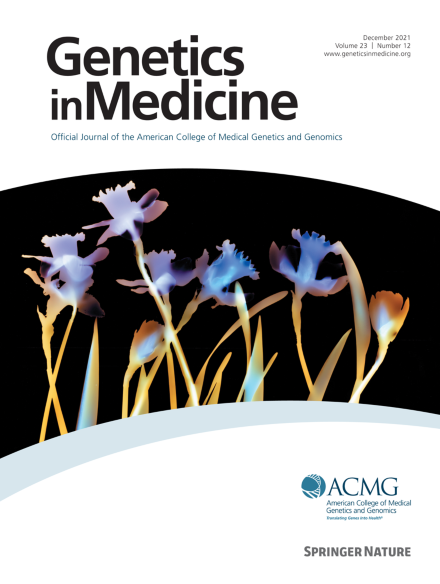初级保健提供者从国家研究中获得机会性基因组结果的观点-百万退伍军人计划可操作结果的回报(MVP-ROAR)研究。
IF 6.6
1区 医学
Q1 GENETICS & HEREDITY
引用次数: 0
摘要
背景:越来越多的患者获得遗传健康信息,并在他们的初级保健提供者(PCP)的帮助下将其纳入他们的护理。然而,pcp可能没有充分准备有效地利用遗传结果。在退伍军人健康管理局(VA)的卫生系统中,百万退伍军人计划可操作结果返回-家族性高胆固醇血症(MVP-ROAR-FH)研究临床证实并返回与家族性高胆固醇血症(FH)相关的遗传结果,该结果在国家生物银行计划中确定。方法:通过MVP-ROAR-FH研究获得患者遗传结果的pcp被邀请参加半结构化访谈,探讨pcp对FH的熟悉程度,结果如何影响医疗管理,并提出流程改进建议。访谈记录和分析使用定向内容分析和不断比较的方法,以确定关键主题。结果:对9名pcp的访谈显示,他们对基因检测和FH的熟悉程度各不相同。大多数pcp没有将FH与常见的高胆固醇问题区分开来,并且已经使用了类似的治疗方法。许多pcp不记得收到过MVP-ROAR-FH研究的结果。医疗记录中的警报被认为是沟通结果的有效手段。pcp重视遗传学在告知患者护理和识别有风险的家庭成员方面的作用,但注意到一些实施障碍,如额外的工作量和不明确的医疗管理效益。关于改进结果披露的建议包括简化基因检测报告和相关的支持文件。结论:该研究代表了对pcp从与国家医疗保健系统相关的生物库接收基因检测结果的经验的首次调查。结果表明,pcp通常认为基因检测是有益的,尽管它们可能不会显著改变医疗管理。pcp表示,将遗传学纳入常规护理可能会带来负担,需要额外的培训,这可能不现实。这项研究强调了获取遗传信息的必要性,这可以由专门的支持角色或不同的临床专业协助将遗传结果纳入患者护理中。本文章由计算机程序翻译,如有差异,请以英文原文为准。
Primary care providers’ perspectives on receiving opportunistic genomic results from a national study: The Million Veteran Program Return Of Actionable Results (MVP-ROAR) Study
Purpose
Patients are increasingly obtaining genetic health information and integrating it into their care with the help of their primary care provider (PCP). However, PCPs may not be adequately prepared to effectively utilize genetic results. Across the Veterans Health Administration health system, the Million Veteran Program Return Of Actionable Results-Familial Hypercholesterolemia (MVP-ROAR-FH) Study clinically confirms and returns genetic results associated with familial hypercholesterolemia (FH), identified in a national biobank program.
Methods
PCPs who received their patient’s genetic results through the MVP-ROAR-FH study were invited to participate in semistructured interviews, which explored PCPs’ familiarity with FH, how the results affected medical management, and suggestions for process improvement. Interviews were transcribed and analyzed using directed content analysis and constant comparison methods to identify key themes.
Results
Interviews with 9 PCPs revealed varied levels of familiarity with genetic testing and FH. Most PCPs did not distinguish FH from common high cholesterol issues and already used similar treatment approaches. Many PCPs did not recall receiving results from the MVP-ROAR-FH study. Alerts in medical records were deemed effective for communicating results. PCPs valued genetics in informing patient care and identifying at-risk family members but noted several implementation barriers, such as additional workload and unclear medical management benefits. Recommendations for improving results disclosure included simplifying the genetic testing report and associated support documents.
Conclusion
The study represents the first investigation into PCPs’ experiences with receiving genetic test results from a biobank linked to a national healthcare system. Results suggest that PCPs generally view genetic testing as beneficial, although they may not significantly alter medical management. PCPs expressed that integrating genetics into routine care may be burdensome and require additional training, which may not be practical. The study underscores the need for accessible genetic information, which could be aided by specialized support roles or different clinical specialties assisting with incorporating genetic results into patient care.
求助全文
通过发布文献求助,成功后即可免费获取论文全文。
去求助
来源期刊

Genetics in Medicine
医学-遗传学
CiteScore
15.20
自引率
6.80%
发文量
857
审稿时长
1.3 weeks
期刊介绍:
Genetics in Medicine (GIM) is the official journal of the American College of Medical Genetics and Genomics. The journal''s mission is to enhance the knowledge, understanding, and practice of medical genetics and genomics through publications in clinical and laboratory genetics and genomics, including ethical, legal, and social issues as well as public health.
GIM encourages research that combats racism, includes diverse populations and is written by authors from diverse and underrepresented backgrounds.
 求助内容:
求助内容: 应助结果提醒方式:
应助结果提醒方式:


